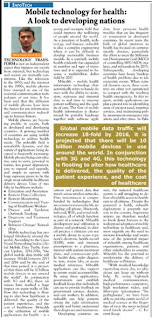Mobile technology for health: A look to developing nations
Mobile technology for health: A look to developing nations
Developing countries endure from pervasive health troubles that are less frequent or nonexistent in developed countries. In recent years the bulk of global attention to health has focused on communicable diseases, particularly the effort to meet the Millennium Development Goal (MDG) of controlling HIV/AIDS, malaria, and tuberculosis by 2015. Subsequently, developing countries have heavy burdens of health problems due to idiosyncratic events. When natural disasters occur, these countries are often not operational to compact with the resulting health emergencies. In this regards, mobile applications can play a pivotal role in identifying areas of greatest need, targeting services, and maintaining public awareness in emergency situations and after crises. In Pakistan, the national healthcare system is still struggling to deliver affordable access to healthcare to all citizens. Despite the potential it holds, m-health deployment is presently narrow in the country. Imperative actions are therefore needed to break down barriers to the widespread adoption of mobile technology in healthcare and, most urgently are the need to increase knowledge and awareness of the potential impact of m-health among healthcare organizations, patients, and other stakeholders in country. M-health has the potential to revolutionize the delivery of healthcare in Pakistan.


Comments
Post a Comment